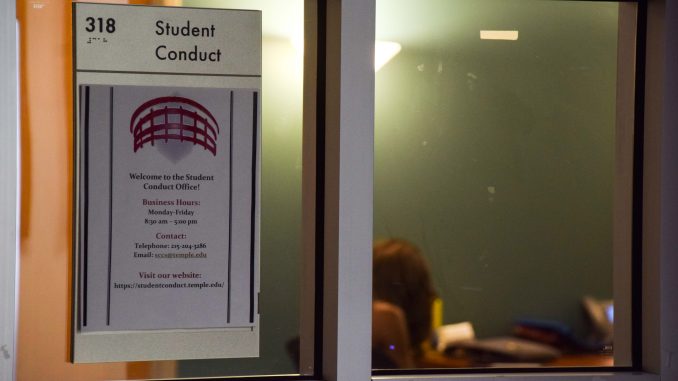
Temple University implemented two new expansions to its Student Conduct Code regarding bias-related intimidation or harassment and protecting students’ First Amendment rights.
The review committee proposed and approved two bias-related recommendations in the 2020-21 academic year and are now being implemented this fall, wrote Stephanie Ives, the dean of students, in an email to The Temple News.
“Evolution in recognizing and addressing bias, racism, systemic oppression and privilege is ongoing and Temple is reflective of society’s efforts to wrestle with and address these issues,” Ives wrote.
The Student Conduct Code outlines bias-related intimidation or harassment, which includes verbal, physical or electronic threats to a person’s protected category, which includes age, color, disability, marital status, national or ethnic origin, race, religion, sex including pregnancy, sexual orientation, gender identity, veteran status and genetic information.
Valerie Harrison, Temple’s vice president of public affairs and Ives led the committee that passed the expansion last month, Ives wrote.
The committee reviewed other universities’ Student Conduct Codes, searched for limitations present in the current Student Conduct Code, reviewed case law and analyzed how the new expansion would affect students, Ives wrote.
Morgan Williams, a junior biology major at Temple, believes the university implemented two amendments that “contradict each other,” and that the expansions will muddle what is and isn’t considered bias-related intimidation, harassment or free speech.
“There’s a line you shouldn’t cross when it comes to certain things,” Williams said.
The university’s conduct board would determine how to address individual cases where the lines are blurred between the biased intimidation and harassment code and free speech, Ives wrote.
The board would determine if the student’s behavior violates a provision in the Student Conduct Code and is categorized as being motivated by bias, Ives wrote. The board would then assess if the behavior could be considered harassment.
If the board finds that the behavior is considered harassment they will determine if there is evidence that the harassment was against someone of a protected category, Ives wrote. If it is found that the harassment is bias-related, the student would then face consequences.
With the assistance of the Office of Institutional Diversity Equity Advocacy and Leadership, students who violate this charge will be subject to educational and developmental sanctions, Ives wrote.
In terms of protecting students’ freedom of speech, Ives wrote that the bias-related intimidation and harassment charges are unlikely to stand alone and may be accompanied by another Student Conduct Code charge, like threats, harassment, intimidation or disorderly conduct.
This addition aligns with a June 5, 2020, tweet from the university addressing racist social media posts from current and incoming Temple students, The Temple News reported. The tweet acknowledges that “hateful speech that is antithetical to the university’s mission” is protected by the First Amendment and the Student Conduct Code.
Former Provost JoAnne Epps and former President Richard Englert passed last year’s recommendations that addressed hate speech, racism and bias which, along with the university’s $1 million anti-racism initiative, were created to give the university greater ability to respond to hate speech, The Temple News reported.
“Through education, we can help create better people in general,” said Allison Grosick, a sophomore secondary education major.



Be the first to comment